| |||||
| Decades: | |||||
|---|---|---|---|---|---|
| See also: | Other events of 2016 History of the Democratic Republic of the Congo | ||||
The following lists events that happened during 2016 in the Democratic Republic of the Congo .
| |||||
| Decades: | |||||
|---|---|---|---|---|---|
| See also: | Other events of 2016 History of the Democratic Republic of the Congo | ||||
The following lists events that happened during 2016 in the Democratic Republic of the Congo .
Discovered in the 1990s, the earliest human remains in the Democratic Republic of the Congo have been dated to approximately 90,000 years ago. The first real states, such as the Kongo, the Lunda, the Luba and Kuba, appeared south of the equatorial forest on the savannah from the 14th century onwards.

The Democratic Republic of the Congo, also known as DR Congo, the DRC, DROC, Congo-Kinshasa, or simply the Congo, is a country located in Central Africa. It was formerly called Zaire (1971–1997). It is, by area, the largest country in sub-Saharan Africa, the second-largest in all of Africa, and the 11th-largest in the world. With a population of over 84 million, the Democratic Republic of the Congo is the most populous officially Francophone country, the fourth-most-populous country in Africa, and the 16th-most-populous country in the world. Since 2015, the Eastern DR Congo has been the scene of an ongoing military conflict in Kivu.

Joseph Kabila Kabange is a Congolese politician who served as President of the Democratic Republic of the Congo between January 2001 and January 2019. He took office ten days after the assassination of his father, President Laurent-Désiré Kabila. He was elected as President in 2006 and re-elected in 2011 for a second term. Since stepping down after the 2018 election, Kabila, as a former president, will be a senator for life, according to the Constitution of the DRC.
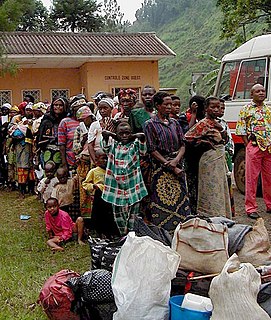
The Second Congo War began in the Democratic Republic of the Congo in August 1998, little more than a year after the First Congo War, and involved some of the same issues. The war officially ended in July 2003, when the Transitional Government of the Democratic Republic of the Congo took power. Although a peace agreement was signed in 2002, violence has continued in many regions of the country, especially in the east. Hostilities have continued since the ongoing Lord's Resistance Army insurgency, and the Kivu and Ituri conflicts.
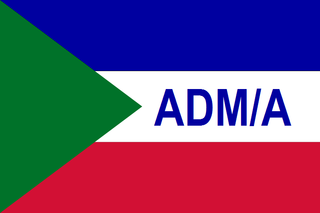
The Allied Democratic Forces is an Islamist rebel group in Uganda and the Democratic Republic of the Congo (DRC), considered a terrorist organisation by the Ugandan government. It was originally based in western Uganda but has expanded into the neighbouring DRC.

The Ituri conflict was a major conflict between the agriculturalist Lendu and pastoralist Hema ethnic groups in the Ituri region of the north-eastern Democratic Republic of the Congo (DRC). While the two groups had fought since as early as 1972, the name 'Ituri conflict' refers to the period of intense violence between 1999 and 2003. Armed conflict continues to the present day.

General elections were held in the Democratic Republic of the Congo on July 30, 2006. They were the first multiparty elections in the country in 41 years, and the first since the overthrow of longtime leader Mobutu Sese Seko nine years earlier. Voters went to the polls to elect both a new President of the Republic and a new National Assembly, the lower-house of the Parliament.
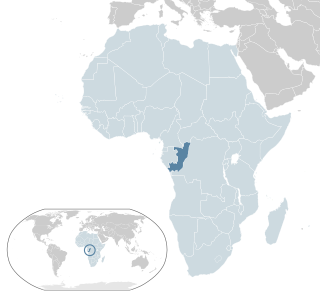
The Second Republic of the Congo Civil War was the second of two ethnopolitical civil conflicts in the Republic of the Congo, beginning on 5 June 1997 and continuing until 29 December 1999. The war served as the continuation of the civil war of 1993–94 and involved militias representing three political candidates. The conflict ended following the intervention of the Angolan army, which reinstated former president Denis Sassou Nguesso to power.
Congolese history in the 2000s has primarily revolved around the Second Congo War (1998–2003) and the empowerment of a transitional government.

Moïse Katumbi Chapwe is a Congolese businessman and politician. He was Governor of Katanga Province, located in the southern part of the Democratic Republic of the Congo, from 2007 to September 2015. He was a member of the People's Party for Reconstruction and Democracy (PPRD) until September 2015. He has been described by The Economist as "probably the second most powerful man in the Democratic Republic of Congo after the president, Joseph Kabila". Jeune Afrique named him "African of the Year" in 2015.
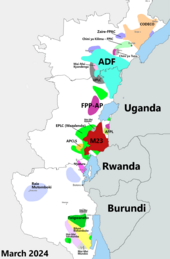
The Kivu conflict began in 2004 in the eastern Congo as an armed conflict between the military of the Democratic Republic of the Congo (FARDC) and the Hutu Power group Democratic Forces for the Liberation of Rwanda (FDLR) in the Democratic Republic of the Congo. It has broadly consisted of three phases, the third of which is an ongoing conflict. Prior to March 2009, the main combatant group against the FARDC was the National Congress for the Defence of the People (CNDP). Following the cessation of hostilities between these two forces, rebel Tutsi forces, formerly under the command of Laurent Nkunda, became the dominant opposition to the government forces.

The Democratic Republic of the Congo, and the east of the country in particular, has been described as the "Rape Capital of the World," and the prevalence and intensity of all forms of sexual violence has been described as the worst in the world. Human Rights Watch defines sexual violence as "an act of a sexual nature by force, or by threat of force or coercion," and rape as "a form of sexual violence during which the body of a person is invaded, resulting in penetration, however slight, of any part of the body of the victim, with a sexual organ, or of the anal or genital opening of the victim with any object or other part of the body."
The Democratic Republic of the Congo (DRC) is a source and destination country for men, women, and children subjected to trafficking in persons, specifically conditions of forced labor and forced prostitution. The majority of this trafficking is internal, and much of it is perpetrated by armed groups and government forces outside government control within the DRC's unstable eastern provinces.

The United Nations Force Intervention Brigade (FIB) is a military formation which constitutes part of the United Nations Organization Stabilization Mission in the Democratic Republic of the Congo (MONUSCO). It was authorized by the United Nations Security Council on 28 March 2013 through Resolution 2098. Although it is not the first instance in which the use of force was authorized by the UN, the Force Intervention Brigade is the first UN peacekeeping operation specifically tasked to carry out targeted offensive operations to "neutralize and disarm" groups considered a threat to state authority and civilian security. In this case, the main target was the M23 militia group, as well as other Congolese and foreign rebel groups. While such operations do not require the support of the Armed Forces of the Democratic Republic of the Congo (FARDC), the Force Intervention Brigade often acts in unison with the FARDC to disarm rebel groups.

The Allied Democratic Forces insurgency is an ongoing conflict waged by the Allied Democratic Forces in Uganda and the Democratic Republic of the Congo, against the governments of those two countries. The insurgency began in 1995, intensifying in 2013, resulting in hundreds of deaths. The ADF is known to currently control a number of hidden camps which are home to about 2,000 people; in these camps, the ADF operates as proto-state with "an internal security service, a prison, health clinics, and an orphanage" as well as schools for boys and girls.

General elections were held in the Democratic Republic of the Congo on 30 December 2018, to determine a successor to President Joseph Kabila, as well as for the 500 seats of the National Assembly and the 715 elected seats of the 26 provincial assemblies. Félix Tshisekedi (UDPS) won with 38.6% of the vote, defeating another opposition candidate, Martin Fayulu, and Emmanuel Ramazani Shadary, backed by the ruling party PPRD. Fayulu alleged that the vote was rigged against him in a deal made by Tshisekedi and outgoing President Kabila, challenging the result in the DRC's Constitutional Court. Different election observers, including those from the country's Roman Catholic Church, also cast doubt on the official result. Nonetheless on 20 January the Court rejected his appeal and declared Tshisekedi as the winner. Parties supporting President Kabila won the majority of seats in the National Assembly. Félix Tshisekedi was sworn in as the 5th President of the Democratic Republic of the Congo on 24 January 2019, making it the first peaceful transition of power in the country since it became independent from Belgium in 1960.
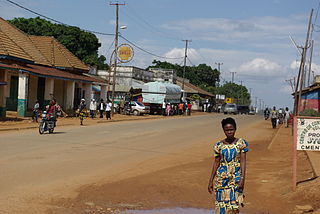
On 14 August 2016, multiple assailants raided the district of Rwangoma in the city of Beni which is located in North Kivu of the Democratic Republic of Congo (DRC). The city is located in the popular Virunga National Park. At least 64 people were killed, as 64 bodies had been located during the search. Officials estimate the death toll to be from 75 to 101. An unknown number of people were injured. The Ugandan rebel group Allied Democratic Forces (ADF) were suspected to be behind to attack by the DRC. The incident is another in a series of massacres in Beni that have left over 700 people dead since October 2014.

On 20 December 2016 the Democratic Republic of the Congo's president, Joseph Kabila, announced that he would not leave office despite the end of his constitutional term. Protests subsequently broke out across the country, which has never had a peaceful transfer of power since it gained independence in 1960. The protests were met with the government's blocking of social media, and violence from security forces which left dozens dead. Foreign governments condemned the attacks against protesters.
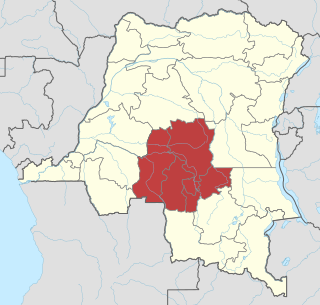
The Kamwina Nsapu rebellion, also spelled Kamuina Nsapu rebellion, is an ongoing rebellion instigated by the Kamwina Nsapu militia against state security forces in the provinces of Kasaï-Central, Kasaï, Kasai-Oriental, Lomami and Sankuru. The fighting began after the militia, led by Kamwina Nsapu, attacked security forces in August 2016.
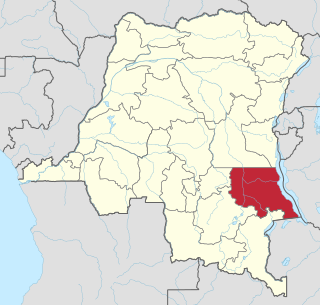
The Batwa–Luba clashes are a series of ongoing clashes in the Democratic Republic of the Congo (DRC) between the Pygmy Batwa people, and the Luba people starting in 2013.